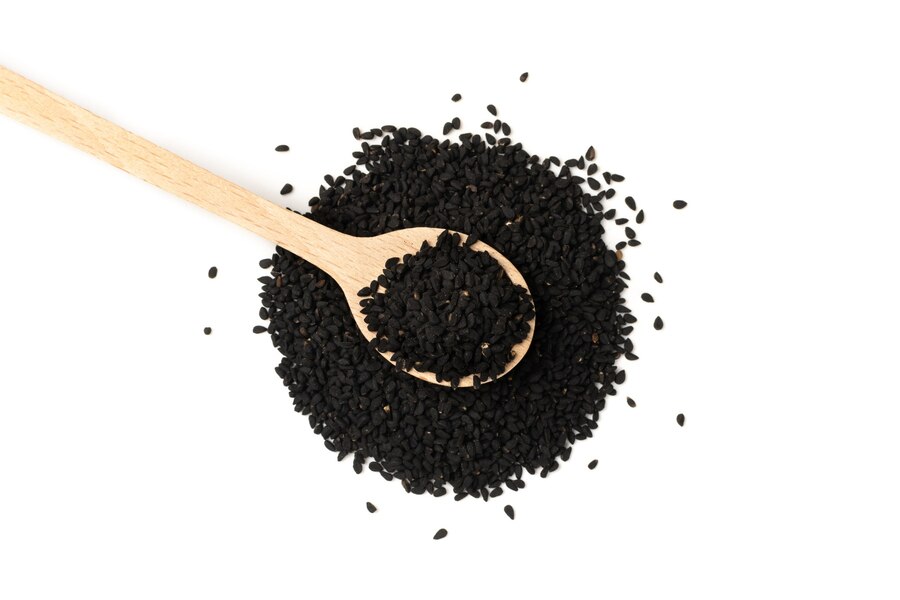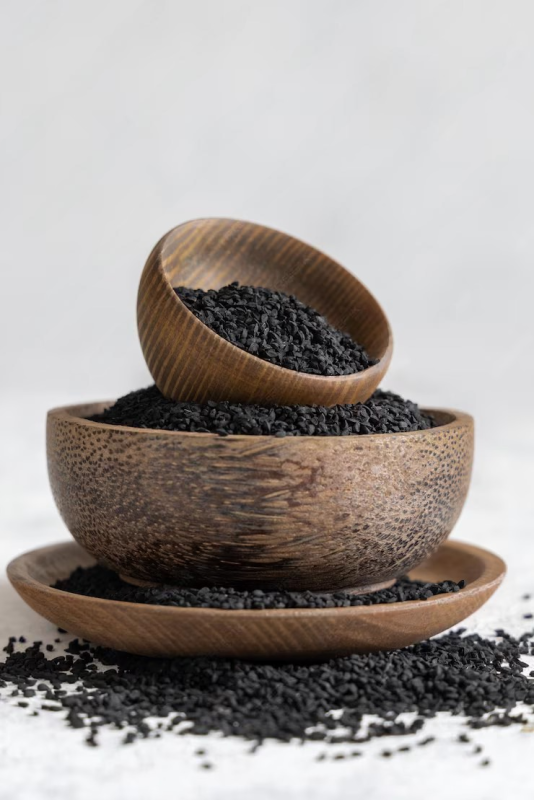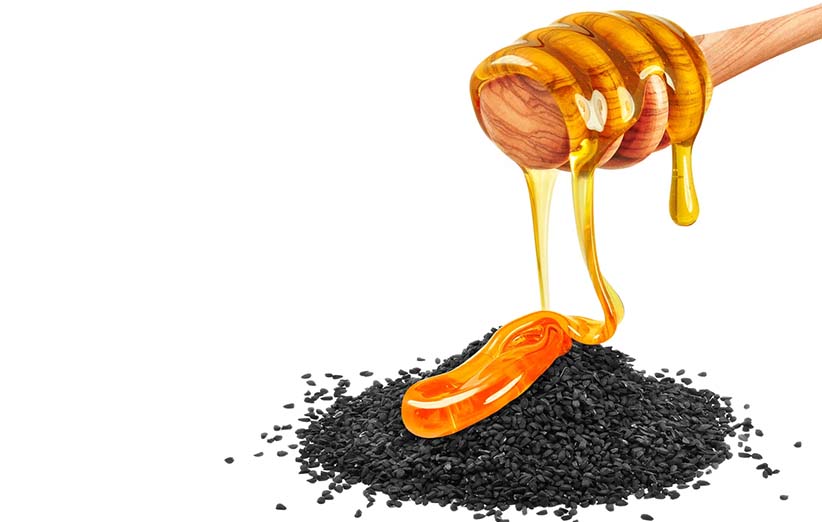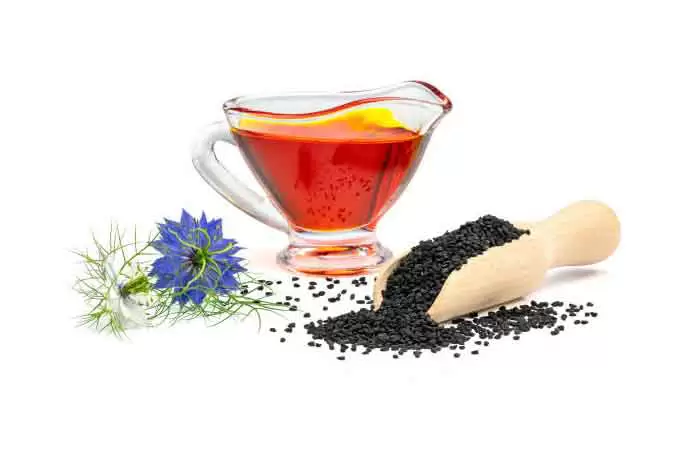Black seed is a flowering plant that matures in one year. This plant grows in Eastern Europe, Western Asia, Bulgaria, Romania, Cyprus, Iraq, Turkey and Iran.
Of course, black seeds are also grown in European and Asian countries today.
This plant belongs to Alale family and its petals are from five to eight and its black seeds are located in the center of the flower and it has a special smell. This plant grows about 20 to 30 cm and has a large three-parted capsule-like fruit that contains many seeds.

Black seeds are used as spices or additives in the food industry, including cooking and baking.
These seeds are used as medicine or spice.
It is one of the most widely used spices with a bitter taste, which is usually used as a flavoring in pickles or on bread.
Black seed compounds :
Black seed is rich in polyphenols and tocopherols and its oil contains linoleic, oleic, palmitic and stearic acids.
Thymoquinone along with its derivatives such as thymohydroquinone and thymol are the most important medicinal substances of black seed which are abundantly found in black seed.
These substances have antioxidant properties. Antioxidants also generally protect the body against several types of chronic diseases, including cancer, diabetes, heart disease, and obesity.
Other names of black seed
Siyavele, Sia sevnija, Siehdane, Black Egg, Black Sonich, Black Sonoch, Black Commune, Shehneez, Sheniz, Shunoz, Shenz, Shiniz, Seniz, Schweiz, Indian Commune, Nankhah Grange, Nankhae, Nankhae, Nanokhieh, Shoneys, Its other names are Kabudan, Ghabaj, Khunjak, Tashmizaj, Bashmeh, Boganj, Bezganj, Siahbirgh, Shanbeez, Shonana, Kalanji, and Ghaliz.
The medicinal benefits of this plant are mainly due to its main active compound called thymoquinone. This substance has antioxidant, anti-inflammatory and other therapeutic benefits. These substances protect the body against cell damage and chronic diseases.
Properties of black seeds :
- Asthma

- Effect on weight loss
- Impact on heart disease risk
- Anemia
- Gastrointestinal tract infection caused by Helicobacter pylori
- Convulsions
- Arthritis
- Bronchitis
- Prevention of cancer
- High cholesterol
- Useful for cough
- Skin health
- Useful for nervous diseases
- Flu
- To treat uterine pain
- Menstrual disorders
- Weight Loss
- Eye health
- Treatment of toothache
- Headache
- Nasal congestion
- Treatment of intestinal worms
- Parasites and abscesses
Complications of black seed :
Black seed reduces inflammation, relieves pain, strengthens the body’s immune system, and removes infection, in addition to being anti-cancer. But like any herbal and chemical medicine, it has side effects. Therefore, it is better to consult a specialist doctor or traditional medicine doctor before using it.
The following are the side effects of black seed :
- Contact dermatitis
- low blood pressure
- Allergic reactions
- Drug interactions
- Possibility of miscarriage and premature delivery due to uterine contraction
- Skin problems
- Bleeding disorder
The benefits of chewing black seeds in the morning on an empty stomach are :
- These seeds are warm in nature and chewing them while fasting causes the release of a substance called thymoketone, which has anticonvulsant properties and can delay the onset of seizures and, in addition, reduce the duration of seizures.
- Chewing black seed in the morning on an empty stomach helps to expel stomach gases and reduce abdominal bloating.
- Since these seeds have antibacterial properties, chewing them in the morning on an empty stomach cleans the digestive system and expels worms.
- Other properties of these seeds include activating female hormones, regulating the menstrual cycle, and improving labor and uterine pain.
- These seeds have anti-inflammatory properties, so chewing them in the morning on an empty stomach can relieve many pains.
- Black seeds contain a lot of fiber, which can keep you full for a long time by chewing them in the morning on an empty stomach. So if you decide to lose weight, do not forget to chew black seeds in the morning on an empty stomach.
Black seed and honey :

One of the most important potions is the combination of black seeds and honey. The use of this potion can be effective in treating many diseases.
- Anti-inflammatory and pain relief
- Antibacterial and cleansing of the digestive system
- Strengthening the body’s immune system and treating colds
- Soothing the lungs and treating dry coughs
- Eliminate bloating and abdominal pain
- Regulation of blood pressure
- This potion can be used to treat acne and itchy skin.
How to prepare black seed and honey potion :
To prepare black seed and honey potion, just mix one tablespoon of black seed with half a kilo of honey. It is better to grind black seeds to get more of its properties.
After grinding the black seed, mix it with honey immediately, because it loses its beneficial properties when exposed to air.
You can eat this special concoction with milk or water after breakfast and dinner.
This potion contains minerals and compounds such as zinc, fefer, calcium, potassium and various vitamins C, E, B2, B9, B1 and B3 and is very effective in breaking up kidney and bladder stones.
Harms of black seeds and honey
Every food item, along with its countless benefits, can also have disadvantages, and black seeds are no exception to this rule. So far, we have learned about the numerous properties of black seeds and you know that this medicinal plant has many therapeutic properties, but you should know that the consumption of these black seeds may cause side effects for some people.
Among the disadvantages of black seeds, the following can be mentioned :
- Cause sensitivity and allergy in some people
- Slowing down and preventing uterine contractions during pregnancy
- Slow blood clotting and increase the risk of bleeding
- Lower blood sugar levels
- Interference with some drugs

- Nausea
Black seed tea :
Black seed helps strengthen the immune system and protects you against many different diseases. To prepare tea, put one to two teaspoons of black seeds in water and heat it.
After the water boils, pass the mixture of black seeds and water through a strainer and let it cool a little. You can drink this tea daily in the morning after breakfast or at night after eating.
| Table of nutritional values of black seeds | |
| Compounds of constituent | Amount of each in 100 grams of food material |
| Energy | 345 kcal |
| carbohydrate | 52.00 grams |
| Protein | 16.67 grams |
| fat | 15.00 grams |
| Water | 6.21 grams |
| fiber | 40.00 grams |
| sugar Loaf | 0.00 grams |
| Cholesterol | 0.00 mg |
| Black seed vitamins table | |
| Type of vitamin | Amount of each in 100 grams of food material |
| Vitamin A | 0.00 µg |
| Vitamin D | 0.00 µg |
| Vitamin E | 0.18 mg |
| Vitamin K | 0.00 µg |
| Vitamin C | 0.02 mg |
| Thiamine (B1) | 0.02 mg |
| Riboflavin (B2) | 0.03 mg |
| Niacin (B3) | 0.09 mg |
| Choline (B4) | 0.40 mg |
| pantothenic acid (B5) | 0.06 mg |
| Vitamin B6 | 0.05 mg |
| Folate (B9) | 1.00 micrograms |
| Vitamin B12 | 0.00 mg |
| Black seed mineral table | |
| Mineral type | Amount of each in 100 grams of food material |
| Calcium | 15.00 mg |
| iron | 12.00 mg |
| magnesium | 6.30 mg |
| phosphorus | 4.00 mg |
| potassium | 44.00 mg |
| sodium | 17.00 mg |
| Roy | 0.05 mg |
| copper | 1.03 mg |
| Manganese | 0.20 mg |
| selenium | 0.00 µg |
The products we offer are:
kaleghochi pistachio : link
Condensed Milk : link
Licorice Root : link









Usually I do not read article on blogs however I would like to say that this writeup very compelled me to take a look at and do so Your writing taste has been amazed me Thanks quite nice post
I genuinely enjoy reading through on this internet site, it has excellent blog posts.